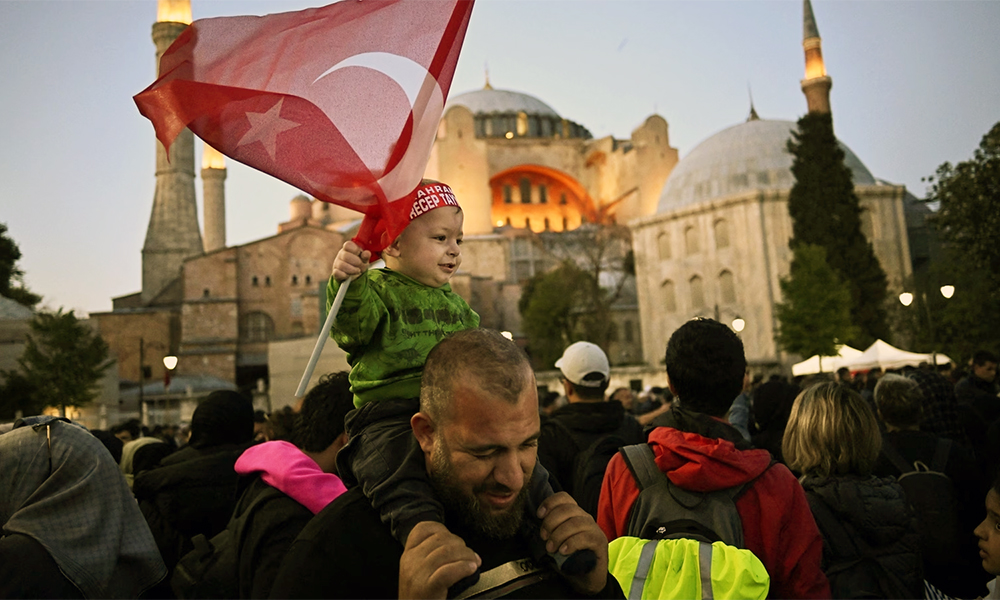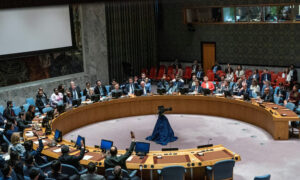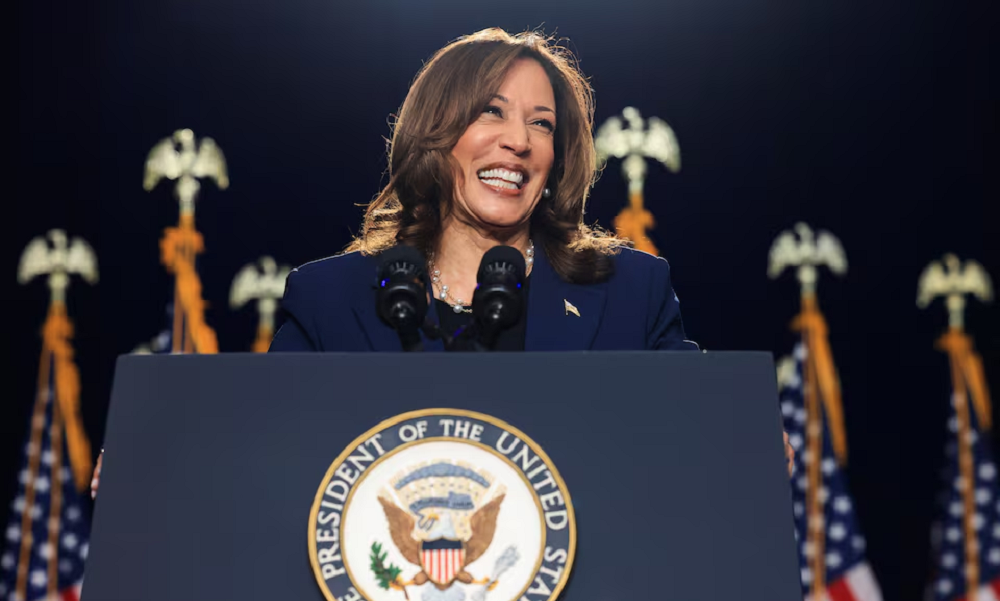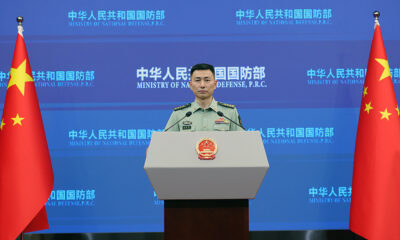World
Turkey votes in pivotal elections that could end Erdogan’s 20-year rule

Turks voted on Sunday in one of the most important elections in modern Turkey’s 100-year history, which could either unseat President Tayyip Erdogan and halt his government’s increasingly authoritarian path or usher in a third decade of his rule.
The vote will decide not only who leads Turkey, a NATO-member country of 85 million, but also how it is governed, where its economy is headed amid a deep cost of living crisis, and the shape of its foreign policy, which has taken unpredictable turns, Reuters reported.
Opinion polls give Erdogan’s main challenger, Kemal Kilicdaroglu, who heads an alliance of six opposition parties, a slight lead, but if either of them fail to get more than 50% of the vote there will be a runoff election on May 28.
Voters will also elect a new parliament, likely a tight race between the People’s Alliance comprising Erdogan’s conservative Islamist-rooted AK Party (AKP) and the nationalist MHP and others, and Kilicdaroglu’s Nation Alliance formed of six opposition parties, including his secularist Republican People’s Party (CHP), established by Turkey’s founder Mustafa Kemal Ataturk.
Polls opened at 8 a.m. (0500 GMT) and will close at 5 p.m. (1400 GMT). Under Turkish law, the reporting of any results is banned until 9 p.m. By late on Sunday there could be a good indication of whether there will be a runoff vote for the presidency.
In Diyarbakir, a city in the mainly Kurdish southeast which was hit by a devastating earthquake in February, some said they had voted for the opposition and others for Erdogan.
“A change is needed for the country,” said Nuri Can, 26, who cited Turkey’s economic crisis as the reason for voting for Kilicdaroglu. “After the election there will be an economic crisis at the door again, so I wanted change.”
But Hayati Arslan, 51, said he had voted for Erdogan and his AK Party.
“The country’s economic situation is not good but I still believe that Erdogan will fix this situation. Turkey’s prestige abroad has reached a very good point with Erdogan and I want this to continue,” he said.
Queues formed at polling stations in the city, with some 9,000 police officers on duty across the province.
Many in the provinces affected by the earthquake, which killed more than 50,000 people, have expressed anger over the slow initial government response but there is little evidence that the issue has changed how people will vote.
Kurdish voters, who account for 15-20% of the electorate, will play a pivotal role, with the Nation Alliance unlikely to attain a parliamentary majority by itself.
The pro-Kurdish Peoples’ Democratic Party (HDP) is not part of the main opposition alliance but fiercely opposes Erdogan after a crackdown on its members in recent years.
The HDP has declared its support for Kilicdaroglu in the presidential race. It is entering the parliamentary elections under the emblem of the small Green Left Party due to a court case filed by a top prosecutor seeking to ban the HDP over links to Kurdish militants, which the party denies.
If Turks do oust Erdogan it will be largely because they saw their prosperity, equality and ability to meet basic needs decline, with inflation that topped 85% in Oct. 2022 and a collapse in the lira currency.
Kilicdaroglu, a 74-year-old former civil servant, promises that if he wins he will return to orthodox economic policies from Erdogan’s heavy management.
Kilicdaroglu also says he would seek to return the country to the parliamentary system of governance, from Erdogan’s executive presidential system passed in a referendum in 2017. He has also promised to restore the independence of a judiciary that critics say Erdogan has used to crack down on dissent.
In his time in power, Erdogan has taken tight control of most of Turkey’s institutions and sidelined liberals and critics. Human Rights Watch, in its World Report 2022, said Erdogan’s government has set back Turkey’s human rights record by decades.
If he wins, Kilicdaroglu faces challenges keeping united an opposition alliance that includes nationalists, Islamists, secularists and liberals.
The final days of the campaign were marked by accusations of foreign meddling.
Kilicdaroglu said his party had concrete evidence of Russia’s responsibility for the release of “deep fake” online content, which Moscow denied. Erdogan accused the opposition of working with U.S. President Joe Biden to topple him. A U.S. State Department spokesperson said Washington does not take sides in elections.
World
Barack and Michelle Obama endorse Harris in video of live call
Obama, the first U.S Black president, remains one of the most popular figures in the Democratic party even after more than a decade has passed since he was last elected.

Former President Barack Obama and his wife Michelle endorsed Kamala Harris’ bid for president on Friday in a roughly one-minute long video that captured a private phone call between the couple and the current vice president.
“We called to say Michelle and I couldn’t be prouder to endorse you and to do everything we can to get you through this election and into the Oval Office,” Obama told Harris.
“I am proud of you. This is going to be historic,” the former first lady told Harris.
Talking into a cell phone and cracking a few smiles, Harris expressed her gratitude for the endorsement and their long friendship.
“Thank you both. It means so much. And we’re gonna have some fun with this too,” Harris said.
The campaign said the video was the actual call, not a reenactment.
Harris’s surprise bid against Republican rival Donald Trump continues to gain steam from supporters, donors and politicians less than a week after President Joe Biden bowed out of the race amid slumping poll numbers.
Obama, the first U.S Black president, remains one of the most popular figures in the Democratic party even after more than a decade has passed since he was last elected.
Obama has lent his support to Biden during big-money fundraisers, which were among some of the biggest blockbuster events of his campaign.
The endorsement could help activate and sustain energy and fundraising for Harris’ campaign and it signals he is likely to get on the campaign trail for Harris once she is officially the presumptive nominee.
Obama initially withheld his endorsement even as Biden, his former vice president, anointed her as his heir apparent. Obama reportedly did not want to put his thumb on the scale as the party worked through the process of determining its nominee. – Reuters
World
Gaza ceasefire negotiations appear to be in closing stages, senior US official says
The senior U.S. official said both Biden and Harris are “completely aligned” on U.S. policy toward Israel and Gaza.

Negotiations on a ceasefire-for-hostages deal in the Gaza conflict appear to be in their closing stages and U.S. President Joe Biden and Israeli Prime Minister Benjamin Netanyahu will discuss remaining gaps on Thursday, a senior U.S. official said on Wednesday.
The official, briefing reporters ahead of their talks, said the remaining obstacles are bridgeable and there will be more meetings aimed at reaching a deal between Israel and Hamas over the next week, Reuters reported.
Hamas-led fighters stormed into southern Israel on Oct.7, killing 1,200 people and taking 250 captives, according to Israeli tallies, triggering a war in which more than 38,000 people in Gaza have been killed.
Hamas and other militants are still holding 120 hostages; Israel believes around a third of them are dead.
Months of stop-and-start talks have failed to produce a deal to gain release of some of the remaining hostages.
The senior U.S. official said both Israel and Hamas still have some issues to resolve but that a deal is close in which a six-week ceasefire would take place in exchange for the release of women, elderly men and wounded hostages over a 42-day period, read the report.
“It’s a very different negotiation now than just a month ago when we had some fundamentally unbridgeable issues,” the official said.
Biden will hold talks with Netanyahu and then later in the day Vice President Kamala Harris will have a separate meeting with the Israeli leader.
Harris has taken over as the presumed Democratic choice for the November presidential election against Republican Donald Trump, after Biden opted not to seek reelection again under pressure from Democrats concerned about his mental acuity.
The senior U.S. official said both Biden and Harris are “completely aligned” on U.S. policy toward Israel and Gaza, Reuters reported.
“The Israelis will hear full alignment,” the official said.
Related Stories:
UN Security Council backs Israel-Hamas ceasefire plan

Biden says Israel-Gaza war should end now and Israel must not occupy Gaza
World
Harris bashes Trump over ‘fear and hate’ in debut rally
Harris ticked through a list of liberal priorities, saying that if elected she would act to expand abortion access, make it easier for workers to join unions and address gun violence, drawing a sharp contrast with Trump, the Republican nominee for president in the Nov. 5 election.

US Vice President Kamala Harris assailed Donald Trump on Tuesday at her first campaign rally since replacing President Joe Biden as the Democratic presidential candidate, while a Reuters/Ipsos opinion poll showed her taking a marginal lead over her Republican rival.
In a 17-minute speech, Harris aggressively went after Trump’s vulnerabilities, comparing her background as a former prosecutor to his record as a convicted felon, Reuters reported.
Harris ticked through a list of liberal priorities, saying that if elected she would act to expand abortion access, make it easier for workers to join unions and address gun violence, drawing a sharp contrast with Trump, the Republican nominee for president in the Nov. 5 election.
“Donald Trump wants to take our country backward,” she told a cheering crowd of several thousand at West Allis Central High School in a Milwaukee suburb in Wisconsin, a battleground state with a pivotal role in deciding the election outcome.
“Do we want to live in a country of freedom, compassion and rule of law, or a country of chaos, fear and hate?”
The raucous rally was a notable contrast to the smaller, more subdued events Biden held, underscoring Democrats’ hope that Harris, 59, can revive what had been a flagging campaign under Biden, 81.
The audience danced and waved Harris signs, while chants of “Ka-ma-la!” broke out when she took the stage.
Harris led Trump 44% to 42% among registered voters in the national Reuters/Ipsos poll, conducted on Monday and Tuesday after Biden dropped out of the contest on Sunday and endorsed Harris as his successor.
A Reuters/Ipsos poll last week showed Biden, before he ended his campaign, trailing Trump by two percentage points.
Both were within the poll’s three-point margin of error. But the results could signal limited movement in Democrats’ direction – and may suggest that Harris’ elevation to the top of the ticket blunted whatever momentum Trump hoped to gain from last week’s Republican National Convention, also in Milwaukee.
Trump and his allies have tried to tether Harris to some of Biden’s more unpopular policies, including his administration’s handling of the surge of migrants at the southern border with Mexico.
In a conference call with reporters on Tuesday, Trump expressed confidence in his ability to defeat Harris, noting that her previous presidential run in 2020 did not even survive until the first statewide nominating contest.
-

 Sport4 days ago
Sport4 days agoOlympics finally here; What you need to know
-

 Latest News5 days ago
Latest News5 days agoOCHA reports 110 die in landmine explosions in Afghanistan every month
-

 World5 days ago
World5 days agoBiden ends failing reelection campaign, backs Harris as nominee
-

 Regional5 days ago
Regional5 days agoChina braces for twin tropical cyclones after deadly flash floods
-

 Health4 days ago
Health4 days agoHealth partners provide services 589,205 people in Afghanistan in last month
-

 Latest News3 days ago
Latest News3 days agoAfghanistan’s Hajj ministry confirms death of 27 pilgrims in Mecca and Medina
-

 Business4 days ago
Business4 days agoConference on Islamic microfinance kicks off in Kabul
-

 Sport4 days ago
Sport4 days agoACB proposes ODI fixtures against top-tiered teams


























